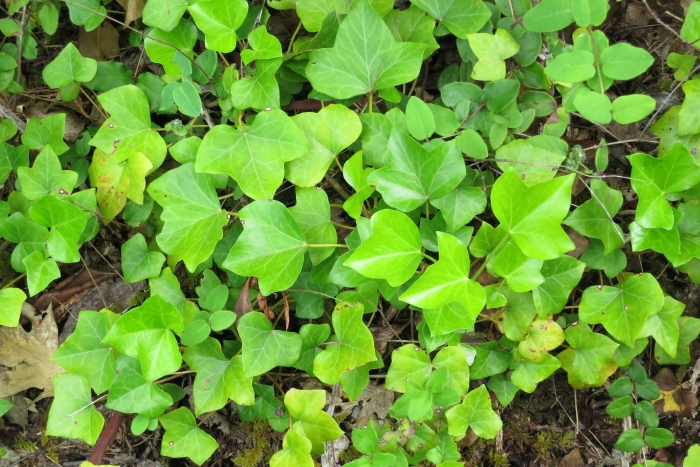Atlantic Ivy
(Hedera hibernica)
Atlantic Ivy (Hedera hibernica)
/
/

Ed Alverson
CC BY 4.0
Image By:
Ed Alverson
Recorded By:
Copyright:
CC BY 4.0
Copyright Notice:
Photo by: Ed Alverson | License Type: CC BY 4.0 | License URL: http://creativecommons.org/licenses/by/4.0/ | Rights Holder: Ed Alverson | Publisher: iNaturalist | Date Created: 2020-06-14T16:58:25-07:00 |




















Estimated Native Range
Summary
Hedera hibernica, commonly known as Atlantic Ivy or Irish Ivy (not Boston Ivy, which is Parthenocissus tricuspidata), is an evergreen climbing vine native to the maritime climates of western Europe, particularly along the Atlantic coast. It thrives in a variety of habitats, including woodlands, scrub areas, and rocky sites, often near the ocean where it can tolerate salt spray. This vigorous climber can reach heights of 20–30 meters when provided with suitable surfaces such as trees, cliffs, or walls, and it can also spread as ground cover in the absence of vertical supports. Its aerial rootlets allow it to cling firmly to substrates.
Atlantic Ivy is appreciated for its lush, dense foliage, which remains green throughout the year, and its ability to cover unsightly structures quickly. It blooms in late summer to early autumn (September–October), with small, inconspicuous yellow-green flowers that are followed by blue-black berries. The plant is slightly poisonous, including the berries, and should be handled with care. It has been awarded the Royal Horticultural Society’s Award of Garden Merit for its ornamental qualities. Commonly used for ground cover, wall decoration, and in urban landscaping, it requires minimal maintenance once established. However, it can become invasive, especially in North America, where it outcompetes native species in mild winter regions. Gardeners should manage its growth to prevent it from overtaking other plants and structures. It adapts to a range of light conditions, from full sun to full shade, and prefers soils with good drainage.CC BY-SA 4.0
Atlantic Ivy is appreciated for its lush, dense foliage, which remains green throughout the year, and its ability to cover unsightly structures quickly. It blooms in late summer to early autumn (September–October), with small, inconspicuous yellow-green flowers that are followed by blue-black berries. The plant is slightly poisonous, including the berries, and should be handled with care. It has been awarded the Royal Horticultural Society’s Award of Garden Merit for its ornamental qualities. Commonly used for ground cover, wall decoration, and in urban landscaping, it requires minimal maintenance once established. However, it can become invasive, especially in North America, where it outcompetes native species in mild winter regions. Gardeners should manage its growth to prevent it from overtaking other plants and structures. It adapts to a range of light conditions, from full sun to full shade, and prefers soils with good drainage.CC BY-SA 4.0
Plant Description
- Plant Type: Vine
- Height: 4-15 feet
- Width: 3-10 feet
- Growth Rate: Moderate
- Flower Color: N/A
- Flowering Season: Summer, Fall
- Leaf Retention: Evergreen
Growth Requirements
- Sun: Full Sun, Part Shade, Full Shade
- Water: Low, Medium
- Drainage: Fast
Common Uses
Bank Stabilization, Bee Garden, Bird Garden, Butterfly Garden, Erosion Control, Low Maintenance, Salt Tolerant
Natural Habitat
Maritime climates of western Europe, including woodlands, scrub areas, and rocky sites near the ocean
Other Names
Common Names: Boston Ivy, Irish Ivy
Scientific Names: , Hedera hibernica, Hedera helix subsp. hibernica, Hedera helix var. hibernica, Hedera helix f. hibernica, Hedera canariensis var. maculata, Hedera grandifolia var. maculata, Hedera helix f. maculata, Hedera helix var. maculata, Hedera hibernica subsp. aureomarginata
GBIF Accepted Name: Hedera hibernica Poit.